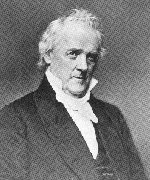Washington City, December 3, 1860
Fellow-Citizens of the Senate and House of
Representatives:
Throughout the year since our last meeting the country
has been eminently prosperous in all its material wants. The
general health has been excellent, our harvests have been
abundant, and plenty smiles throughout the land. Our commerce and
manufactures have been prosecured with energy and industry, and
have yielded fair and ample returns. In short, no nation in the
tide of time has ever presented a spectacle of greater material
prosperity than we have done until within a very recent period.
Why is it, then, that discontent now so extensively
prevails, and the Union of the States, which is the source of all
these blessings, is threatened with destruction?
The long-continued and intemperate interference of the
Northern people with the question of slavery in the Southern
States has at length produced its natural effects. The different
sections of the Union are now arrayed against each other, and the
time has arrived, so much dreaded by the Father of his Country,
when hostile geographic parties have been formed.
I have long foreseen and often forewarned my
countrymen of the now impending danger. This does not proceed
soley from the claim on the part of Congress or the Territorial
legislatures to exclude slavery from the Territories, nor from
the efforts of different States to defeat the execution of the
fugitive-slave law. All or any of these evils might have been
endured by the South without danger to the Union (as others have
been) in the hope that time and reflection might apply the
remedy. The immediate peril arises not so much from these causes
as from the fact that the incessant and violent agitation of the
slavery question throughout the North for the last quarter of a
century has at length produced its malign influence on the slaves
and inspired them with vague notions of freedom. Hence a sense of
security no longer exists around the family altar. This feeling
of peace at home has given place to apprehensions of servile
insurrections. Many a matron throughout the South retires at
night in dread of what may befall herself and children before the
morning. Should this apprehension of domestic danger, whether
real or imaginary, extend and intensify itself until it shall
pervade the masses of the Southern people, then disunion will
become inevitable. Self-preservation is the first law of nature,
and has been implanted in the heart of man by his Creator for the
wisest purpose; and no political union, however fraught with
blessings and benefits in all other respects, can long continue
if the necessary consequence be to render the homes and firesides
of nearly half the parties to it habitually and hopelessly
insecure. Sooner or later the bonds of such a union must be
severed. It is my conviction that this fatal period has not yet
arrived, and my prayer to God is that He would preserve the
Constitution and the Union throughout all generations.
But let us take warning in time and remove the cause
of danger. It can not be denied that for five and twenty years
the agitation at the North against slavery has been incessant. In
1835 pictorial handbills and inflammatory appeals were circulated
extensively throughout the South of a character to excite the
passions of the slaves, and, in the language of General Jackson,
"to stimulate them to insurrection and produce all the
horrors of a servile war." This agitation has ever since
been continued by the public press, by the proceedings of State
and county conventions and by abolition sermons and lectures. The
time of Congress has been occupied in violent speeches on this
never-ending subject, and appeals, in pamphlet and other forms,
indorsed by distinguished names, have been sent forth from this
central point and spread broadcast over the Union.
How easy it would be for the American people to settle
the slavery question forever and to restore peace and harmony to
this distracted country! They, and they alone, can do it. All
that is necessary to accomplish the object, and all for which the
slave States have ever contended, is to be let alone and
permitted to manage their domestic institutions in their own way.
As sovereign States, they, and they alone, are responsible before
God and the world for slavery existing among them. For this the
people of the North are not more responsible and have no more
right to interfere than with similar institutions in Russia or in
Brazil.
==========
At this point in his Message, President Buchanan
began to discuss the legality of secession and then moved on to
other topics. The preceeding material is everything in the
message that pertains to the unfolding secession crisis, and so
represents his view of the situation. |
